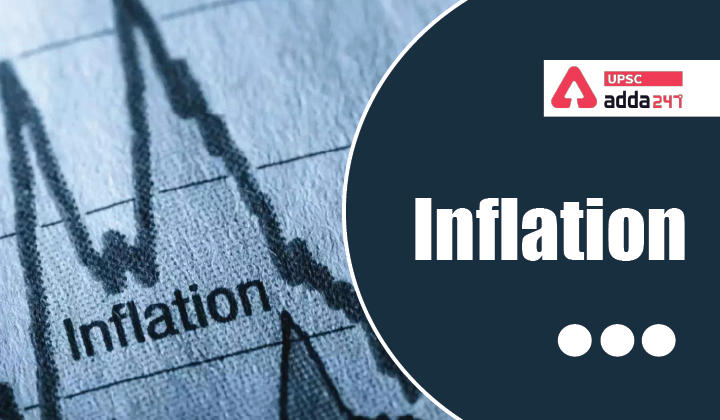Table of Contents
What is inflation?
Inflation is a term used to describe the sustained increase in the general price level of goods and services in an economy over a specific period of time. When inflation occurs, the purchasing power of money decreases, meaning that each unit of currency buys fewer goods or services. Inflation is typically measured using an inflation rate, which represents the percentage change in the average price level of a basket of goods and services over time.
This basket often includes commonly purchased items such as food, housing, transportation, and medical care. Inflation is an economic term describing the sustained increase in prices of goods and services within a period. The annual retail inflation rate in India increased to 4.48% in October of 2021 from 4.35% in September. There are several causes of inflation. One common cause is demand-pull inflation, which occurs when the demand for goods and services exceeds their supply. This can lead to increased prices as businesses raise prices to match the higher demand.
Another cause is cost-push inflation, which happens when the cost of production, such as wages or raw materials, rises and businesses pass on these increased costs to consumers. Inflation can have both positive and negative effects on an economy. Moderate inflation can be a sign of a healthy and growing economy, as it encourages consumer spending and investment.
Inflation causes
- Excess printing of money: Inflation can happen when governments print an excess of money to deal with a crisis. This results in an increase in the price level to an extent that matches the currency surplus. This type of inflation is called demand-pull inflation.
- Rise in production costs: Rise in production costs is a common and most often reason for inflation, which leads to an increase in the price of the final product. Let’s understand this through an example: if the price of raw materials increases, the cost of production also increases, which in turn leads to the company increasing prices to maintain its profits.
- Similarly, rising labor costs can also lead to inflation because when companies accept the worker’s demand of increased wages, companies usually chose to pass on those costs to their customers.
- International lending and national debts: International lending and national debts can also lead to inflation. When nations borrow money, they have to deal with interests, which in the end causes a rise in prices to keep up with their debts.
- Rise in tax and duties: Finally, inflation can be caused by government taxes put on consumer products, especially non-elastic products fuel. Due to the rise in taxes, suppliers often pass on the burden to the consumer.
- Wars and conflicts: Wars can also cause inflation, as governments must both recoup the money spent and repay the funds borrowed from the central bank. Wars or conflicts often affect everything from international trading to labor costs to product demand, so in the end, it always produces a rise in prices.
Inflation effects
- People start consuming or buying less goods and services as their income is limited. It leads to a slowdown not only in consumption but also production. Production is affected because manufacturers would produce fewer goods due to high costs and anticipated lower demand.
- Increased bank interest: Banks will increase interest rates as inflation increases otherwise real interest rates will be negative. (Real interest = Nominal interest rate – inflation). This, in turn, would make borrowing costs for both consumers and corporate
- Higher interest rates also lead to a slowdown in the economy, which in turn could lead to an increase in unemployment as companies start focusing on cost-cutting and reducing hiring. E.g., Jet Airways lay off over 1000 employees to save costs.
- Rising inflation can prompt trade unions to demand higher wages, to keep up with consumer prices. Rising wages in turn can help fuel inflation. So, the vicious cycle will continue.
Headline Inflation Vs Core Inflation
- Headline Inflation is the measure of total inflation in an economy. It includes price rises in food, fuel, and all other commodities. Core inflation is also a term used to denote the extent of inflation in an economy. Core inflation, however, does not consider the inflation in food and fuel.
- So, we can say that,
- Core Inflation= Headline Inflation – (Price of food, fuel, and other volatile commodities).
Types of Inflation
Inflation at Producer Level
- Producer price indices in manufacturing measure the rate of change in prices of products sold as they leave the producer.
- Though a Producer Price Index (PPI) is proposed, its calculation has not started
Inflation at Wholesale Level
- Until recently, Wholesale Price Index (WPI) was the most popular inflation rate calculation methodology in India. The index used to calculate wholesale inflation in a country. WPI is released by the Office of Economic Advisor, Ministry of Commerce and Industry.
Inflation at Retail Level (Consumer Level)
- The consumer often directly buys from the retailer. So, the inflation experienced at retail reflects the actual price rise in the country. It also shows the cost of living better. In India, the index that reflects the inflation rate at the retail level is known as Consumer Price Index (CPI). Unlike WPI, CPI includes both goods and services. CPI is used to calculate the Dearness Allowance (DA) for government employees.
- Four Consumer Price Indices covering different socio-economic groups in the economy:
- Consumer Price Index for Industrial Workers (CPI-IW): Released by Labour Bureau
- Consumer Price Index for Agricultural Labourers (CPI-AL): Released by Labour Bureau
- Consumer Price Index for Rural Labourers (CPI -RL): Released by Labour Bureau
- and Consumer Price Index (Rural/Urban/Combined): Released by CSO, MoSPI



 TSPSC Group 1 Question Paper 2024, Downl...
TSPSC Group 1 Question Paper 2024, Downl...
 TSPSC Group 1 Answer key 2024 Out, Downl...
TSPSC Group 1 Answer key 2024 Out, Downl...
 UPSC Prelims 2024 Question Paper, Downlo...
UPSC Prelims 2024 Question Paper, Downlo...
